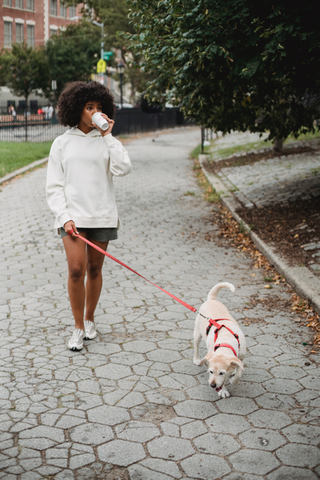What Dog Is Right for Me? The Importance of Choosing the Perfect Breed for Your Lifestyle

Choosing a dog is not a decision to be taken lightly. With over 200 recognised breeds, ranging from their energy levels and sizes to their coat length and general look, it can be difficult to know which dog is the best fit for you and your family.
While choosing a breed solely based on appearance may seem like a great idea, it’s important to consider all aspects when selecting a pet; think about its grooming requirements, exercise levels, and character traits before making your decision.
Unfortunately, many dogs end up in rescue centres because their adopters chose them based on their appearance rather than their suitability for their lifestyle.
Few people consider that some breeds may require greater exercise than others or shed fur excessively - yet this kind of research can ensure that the bond between a new pup and its owner is strong for years to come.
It's well worth reading up on different breeds; speaking with veterinarians who have experience with different animals; visiting animal rescue shelters (minus any pre-conceived ideas); and probing prospective owners as well as members of the public or Facebook groups about what owning a certain breed entails.
Matching Lifestyle with Breed Traits
Imagine having a high-energy, athletic dog in a small apartment, or a calm lap dog in a household that's always on the move. This is where the importance of breed selection comes into play.
Different breeds have evolved to serve various purposes, such as herding, hunting, guarding, and companionship. Their innate traits influence their behaviour, exercise requirements, grooming needs, and overall compatibility with your lifestyle.
Factors to Consider
-
Activity Level: Some breeds are highly active and require rigorous exercise routines, while others are content with shorter walks. Consider your own activity level and how much time you can dedicate to physical and mental stimulation for your dog.
If you are someone who enjoys lounging and relaxation, there are many low-energy breeds such as Bassett Hounds, French Bulldogs and Great Danes that would be ideal for you.
On the other hand, if you have more of an active lifestyle and enjoy running or hiking with your pup, then an energetic breed such as a Border Collie or Airedale Terrier may be the perfect match! -
Size: Think about the size of your living space. A large breed might not be suitable for a small apartment, while a smaller breed might not thrive on a large property.
-
Grooming Needs: Different breeds have different coat types, which come with varying grooming demands. Some require regular brushing and maintenance, while others shed minimally.
Coat type is an important discretionary when selecting a dog. Although it may seem like a simple choice, there are several factors to keep in mind. Shedding, grooming, and allergies should all be taken into account while searching for the perfect pet.
Dogs that shed can require more maintenance than those which shed less fur. Vacuuming more regularly or even purchasing a special cleaner to completely suck up all the furry bits will help preserve a clean home environment.
Long-coated breeds usually need more regular brushing and combing to avoid their hair becoming knotted or dirty. - Temperament: Breed traits often influence temperament. Are you looking for an outgoing, social dog, or a more reserved and independent companion?
- Allergies: Consider any allergies within your household, as some breeds are known to be hypoallergenic. For people with allergies, it's important to prioritize hypoallergenic dogs to lessen reactions from dander or saliva. Researching a breed's characteristics and maintenance needs beforehand ensures the dog's happiness and safety in its new home.
-
Family Dynamics: If you have children or other pets, certain breeds might be more compatible with your family structure.
- Health Concerns: Even pedigree breeds have a certain health problem. Brachycephalic breeds, such as pugs, bulldogs and French Bulldogs are particularly susceptible and often suffer from severe respiratory issues due to their flat faces. It’s important for owners to be aware of these risks before buying a pet and undertake lots of research on the particular breed they are interested in, and the individual breeder.
Research and Consultation
Before making a decision, invest time in thorough research. Explore reputable sources, breed-specific websites, and books that delve into the characteristics of different breeds. You can also consult with veterinarians, trainers, and experienced dog owners who can offer insights based on their expertise. Additionally, attending dog shows or meet-and-greets can provide valuable opportunities to interact with various breeds up close.
Adopting vs. Buying
When choosing a breed, consider both adoption and buying options. Shelters and rescue organizations are filled with loving dogs of all breeds and ages, waiting for a forever home. Adopting not only saves a life but also offers you the chance to find a loyal companion with an established personality.
In contrast, purchasing from a reputable breeder allows you to have a clearer understanding of a puppy's lineage, health history, and potential behaviour traits. It's important to choose a responsible breeder who prioritizes the health and well-being of their dogs.
Rescue Dogs
Adopting a rescue dog can be a rewarding experience, not only for you but also for the dog. Whether you're looking for a pedigree breed or something more mixed-breed and scruffy, there are plenty of rescue dogs out there in need of a loving home.
There are multiple services that offer a dedicated rescue dog option with contact details for breed rescues who have pedigree breeds available. If this doesn’t yield the desired results, many breed clubs can offer expert advice on how to pick the perfect companion and find available adoption options.
In addition to having an understanding of what type of breed is right for you and your lifestyle, it’s important that health tests are done where necessary. Irrespective of whether you prefer purebred or cross-breeds from rescue organisations, checking that parents have been health assessed is vital to ensure they come from responsible breeders.
Both when selecting a Rescue Dog and Pedigree Puppy, research should never be overlooked in order to make sure you get the best fit possible for you and your family.
Conclusion
Selecting the right breed is an essential step in ensuring a fulfilling and lifelong partnership with your dog. By considering factors such as activity level, size, grooming needs, and temperament, you can match a breed's traits with your lifestyle. Whether you choose to adopt from a shelter or purchase from a breeder, the ultimate goal is to find a furry friend who will seamlessly integrate into your life, bringing joy, companionship, and love to every moment you share.
Here are some common questions and concerns people often have when it comes to finding the perfect breed that aligns with their lifestyle:
1. How can I choose a breed that's good with children? If you have kids, it's crucial to choose a breed with a gentle and patient temperament. Breeds like Golden Retrievers, Beagles, and Collies are known for their affinity for children. Always research a breed's interactions with children and consider adopting a dog with a history of being good around kids.
2. I'm looking for a loyal companion. Which breeds are known for strong bonds with humans? Breeds like German Shepherds, Labrador Retrievers, and Cavalier King Charles Spaniels, Dachshunds are renowned for their loyalty and affectionate nature. These dogs often form deep bonds with their owners and thrive on human interaction.
3. How can I gather more information about different breeds? Research is key. Explore breed-specific websites, books, Facebook groups, and online resources that provide detailed information about various breeds. Attend dog shows, meet breeders, and interact with different dogs to get a better feel for their personalities.








Leave a comment